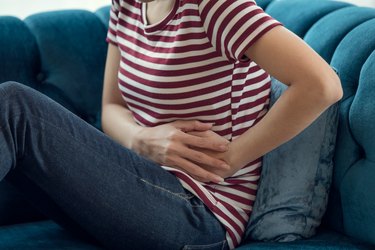
If you feel pain in your lower left abdomen, the most common culprit is diverticulitis. Other causes can include constipation, hernia and urinary tract infections. But if the pain only occurs after you eat, the possibilities narrow down to just a few.
"Left lower abdominal pain that occurs after eating is usually caused by a reaction called the gastrocolic reflex," says Brooks D. Cash, MD, chief of gastroenterology, hepatology and nutrition at the University of Texas Health Science Center at Houston. "This is a normal reaction that occurs when food fills your stomach. Your stomach sends a message to your brain, and your brain causes your sigmoid colon to contract."
Video of the Day
Video of the Day
How Does It Happen?
Harvard Health Publishing explains that your sigmoid colon is the last part of your colon where stool is formed before you have a bowel movement. Because the sigmoid colon is located in the lower left part of your abdomen, problems with the sigmoid colon cause lower left abdominal pain.
"If your sigmoid colon is sensitive or inflamed, your gastrocolic reflex may cause pain because your colon narrows and bends in this area," says Dr. Cash. "Two common conditions increase your risk of pain from this reflex after eating. They are irritable bowel syndrome and constipation."
Irritable bowel syndrome (IBS). According to the National Institute of Diabetes and Digestive and Kidney Diseases (NIDDK), IBS is a group of symptoms that include abdominal pain and changes in bowel habits. IBS causes your colon to be more sensitive. Colon contractions may be painful. People with IBS may have constipation, diarrhea or both, along with pain.
IBS is a common problem, affecting about 12 percent of people in the United States. There is a greater chance that IBS is the cause of lower abdominal pain after eating if you are at higher risk for this condition. Risk factors for IBS include being female, being younger than 50, having a family history of IBS and having a history of high emotional stress, says NIDDK.
Constipation. According to the Mayo Clinic, constipation is having fewer than three bowel movements in one week. Constipation, which also is a common problem, can make it difficult for your colon to push stool out, and your stool can become lumpy and hard. Long-term constipation is constipation that lasts for several weeks or longer.
"If a meal causes a gastrocolic reflex and your sigmoid colon is filled with hard stool, that can be painful," says Dr. Cash.
You may be at higher risk for constipation if you are a female and if you are older. You may also be at higher risk if you don't drink enough fluids, don't get enough physical activity and eat a diet that is low in fiber. Some medications also increase your risk, including sedatives, prescription pain medicines and antidepressants, says the Mayo Clinic.
Another Possible Cause
Another extremely common problem, called diverticulosis, starts when tiny pouches that develop in the sigmoid colon, says Harvard Health Publishing, It affects about a third of Americans by age 60. If these pouches become inflamed or infected, they can cause pain. This complication is called diverticulitis.
About 20 percent of people with diverticulosis develop diverticulitis, adds Harvard Health. Along with left lower abdominal pain, this condition may cause fever, chills, constipation or diarrhea.
"Diverticulitis can cause pain unrelated to eating, but it should be considered as a possible cause of left lower abdominal pain," says Dr. Cash.
Read more: Meals to Eat With Diverticulitis
When to Call Your Doctor
No matter what the cause of your lower left abdominal pain, you should know when to see your doctor. The Mayo Clinic says you should make the call if:
- You have severe abdominal pain.
- You have pain with fever.
- You have persistent constipation or diarrhea.
- You have any blood in your stool.
- You have pain with nausea or vomiting.
- Your abdomen is swollen and tender to touch.
- Brooks D. Cash, MD, chief of gastroenterology, hepatology and nutrition, University of Texas Health Science Center at Houston
- Harvard Medical School: “Diverticular Disease of the Colon”
- National Institute of Diabetes and Digestive and Kidney Diseases: “Irritable Bowel Syndrome”
- Mayo Clinic: “Constipation: Symptoms & Causes”
- Mayo Clinic: “Abdominal Pain”
Is this an emergency? If you are experiencing serious medical symptoms, please see the National Library of Medicine’s list of signs you need emergency medical attention or call 911.